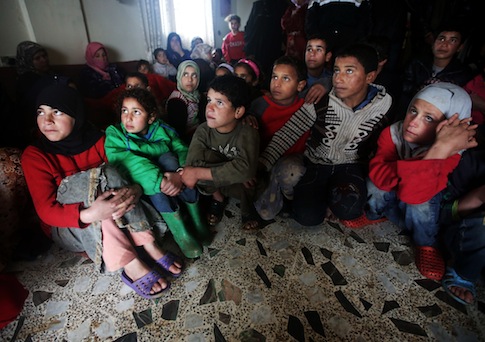Government officials and policy experts gathered at the Senate Foreign Relations Committee Tuesday to discuss the humanitarian crisis in Syria, which they said is rapidly reaching a tipping point.
"The humanitarian situation is dramatic beyond description. The refugee crisis has been accelerating since last summer and has reached staggering proportions since the beginning of this year," United Nations high commissioner for refugees Antonio Guterres told the committee.
Refugees have increased from 3,000 a day in December to 8,000 as of February, Guterres said.
Over a million refugees will be in Lebanon, Jordan, and Turkey by the end of 2013. For countries like Lebanon, with a population of only 4.2 million, the economic and social effects might cause them to close off their borders.
Many of the refugees, 78 percent of whom are women and children, do not have enough camps to support them. They instead live in storefronts, garages, and any place they can find shelter, assistant secretary of state for population, refugees, and migration Anne Richard said.
"It is essential that host countries keep their borders open," Richard said.
Officials and experts agreed problems in the country itself are even greater despite the major problems around Syria.
Getting access into Syria is one of the greatest challenges for United States government officials, said Nancy E. Lindborg, assistant administrator for democracy, conflict and humanitarian assistance at the U.S. Agency for International Development.
The State Department goes through the U.N., international organizations, non-governmental organizations, and local Syrian groups to give unbranded aid inside Syria. As a result, many Syrians do not know the aid comes from the U.S.
"We want to ensure that our humanitarian partners are not unduly targeted," Lindborg said. "We’re branding when and where we can."
The lack of observable aid and a growing sense that the conflict could be resolved with U.S. assistance has left many Syrians angry with the international community, Guterres said.
"The people believe that the international community should come together and find a solution, they don’t blame a specific country. … That is the anger that I’ve witnessed," Guterres said.
Policy expert Tom Malinowski was more critical of the United States’ failure to give adequate aid inside Syria, which has contributed to a growing hostility.
Malinowski, who traveled to northern Syria in December, was shocked at the lack of aid in the region. There was little electricity and fuel to heat homes during the winter. While Malinowski admitted there have been major efforts to raise aid since December, "people still don’t know where it is coming from."
While there is a sense of little help from America, there is a growing appreciation for extreme groups like al-Nusra, who have become "the front edge of the spear" and are one of the most effective forces fighting in Syria.
"You created al-Nusra by not helping us and now you are using it to not help us" Malinowski said, recounting a story from a man in Syria close to the fighting, saying this is becoming a common theme from secular fighters in Syria.
"You can’t solve the humanitarian crisis by not toppling the regime," Sen. Ron Johnson (R., Wis.) said at the hearing.
Malinowski warned that humanitarian aid alone would start to resemble what Bosnian refugees called "bread for the dead."
"People accepted the aid, of course," he said. "They needed to eat and to stay warm. But they never felt that the international community was providing meaningful help so long as atrocities being committed against them continued. Food and medicine might keep them alive long enough to be killed by a bullet or tank shell. But it solved nothing."
